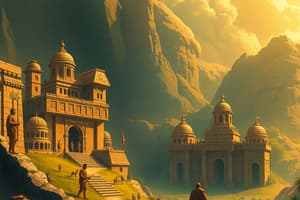Podcast
Questions and Answers
What was one of the primary purposes of writing in ancient civilizations?
What was one of the primary purposes of writing in ancient civilizations?
- To document religious rituals and ceremonies
- To preserve historical accounts and establish laws (correct)
- To create works of literature and poetry
- To facilitate trade and commerce
Which of the following writing systems was developed by the Sumerians?
Which of the following writing systems was developed by the Sumerians?
- Cuneiform (correct)
- Pictograms
- Alphabetic script
- Hieroglyphs
What type of political system was prevalent in early civilizations like Sumer and Egypt?
What type of political system was prevalent in early civilizations like Sumer and Egypt?
- Republic
- Monarchy (correct)
- Oligarchy
- Democracy
What role did religion play in ancient civilizations?
What role did religion play in ancient civilizations?
Which of the following statements best describes the significance of studying ancient civilizations?
Which of the following statements best describes the significance of studying ancient civilizations?
What was a significant contribution of the Sumerian civilization?
What was a significant contribution of the Sumerian civilization?
Where did the Indus Valley Civilization flourish?
Where did the Indus Valley Civilization flourish?
What was a significant development during the Neolithic Revolution?
What was a significant development during the Neolithic Revolution?
Which of the following regions is not associated with the emergence of early civilizations?
Which of the following regions is not associated with the emergence of early civilizations?
What was a significant achievement of the Sumerian civilization in the field of mathematics?
What was a significant achievement of the Sumerian civilization in the field of mathematics?
Flashcards are hidden until you start studying
Study Notes
Ancient Civilizations: Understanding the Foundation of Modern Societies
Since the dawn of humanity, the development of civilizations has shaped the course of our species. Ancient civilizations introduced us to advancements in agriculture, technology, governance, and arts that continue to influence our daily lives. In exploring the subtopic of "Ancient Civilizations," we delve into the fascinating histories of early societies that laid the foundation for modern-day governments, economies, and cultures.
Emergence of Early Civilizations
The emergence of early civilizations coincides with the Neolithic Revolution, marked by the transition from nomadic hunter-gatherer societies to sedentary lifestyles centered around agriculture. This transformation allowed for the growth of urban settlements and the establishment of complex social structures. Among the first civilizations were:
-
Sumerian Civilization: Originating in Mesopotamia around 4500 BC, the Sumerians established the first known civilizations as part of the Fertile Crescent region. Their achievements include the creation of cuneiform, the first recorded writing system, as well as advances in mathematics, astronomy, and the legal code.
-
Indus Valley Civilization: Developing around 3300 BC, this civilization thrived in the Indus River Valley in present-day India and Pakistan. Known for its advanced urban planning, impressive architectural designs, and sophisticated drainage systems, the Indus Valley Civilization played a crucial role in shaping modern Indian society.
The Birth of Writing
One of the most significant developments during the formation of ancient civilizations was the advent of written language. Several early civilizations began using scriptures to communicate complex ideas, preserve history, and establish laws. Writing enabled societies to store information effectively, document transactions, and facilitate administration. Prominent examples of early writing systems include:
-
Cuneiform: Developed by the Sumerians, cuneiform was one of the earliest known writing systems. Its symbols were etched onto clay tablets using a stylus, providing a valuable tool for recording data.
-
Hieroglyphs: A visual language consisting of pictures and logograms, hieroglyphs were used by the ancient Egyptians to convey messages and religious texts.
Political Systems and Governance
As populations grew and communities became more complex, new modes of political organization emerged. Early civilizations like the Sumerians and the Egyptians adopted monarchial systems, with their rulers serving both secular and spiritual functions. This concept of divine kingship persisted for millennia, eventually giving rise to various forms of absolute monarchy and feudalism.
The Impact of Religion
Religion has always been an integral component of human societies. In ancient civilizations, religious beliefs often served as the foundation upon which the state's legitimacy rested. Over time, however, religiously charged ceremonies and rituals evolved into formal religious institutions that governed moral conduct within the society.
Conclusion
By studying ancient civilizations, we gain insight into the origins of modern societies and understand how fundamental concepts such as writing, governance, and religion have evolved over time. As we explore the vast expanse of human history, we recognize the enduring legacy left behind by our ancestors and appreciate the intricate tapestry of cultures that have shaped our world today.
Studying That Suits You
Use AI to generate personalized quizzes and flashcards to suit your learning preferences.




